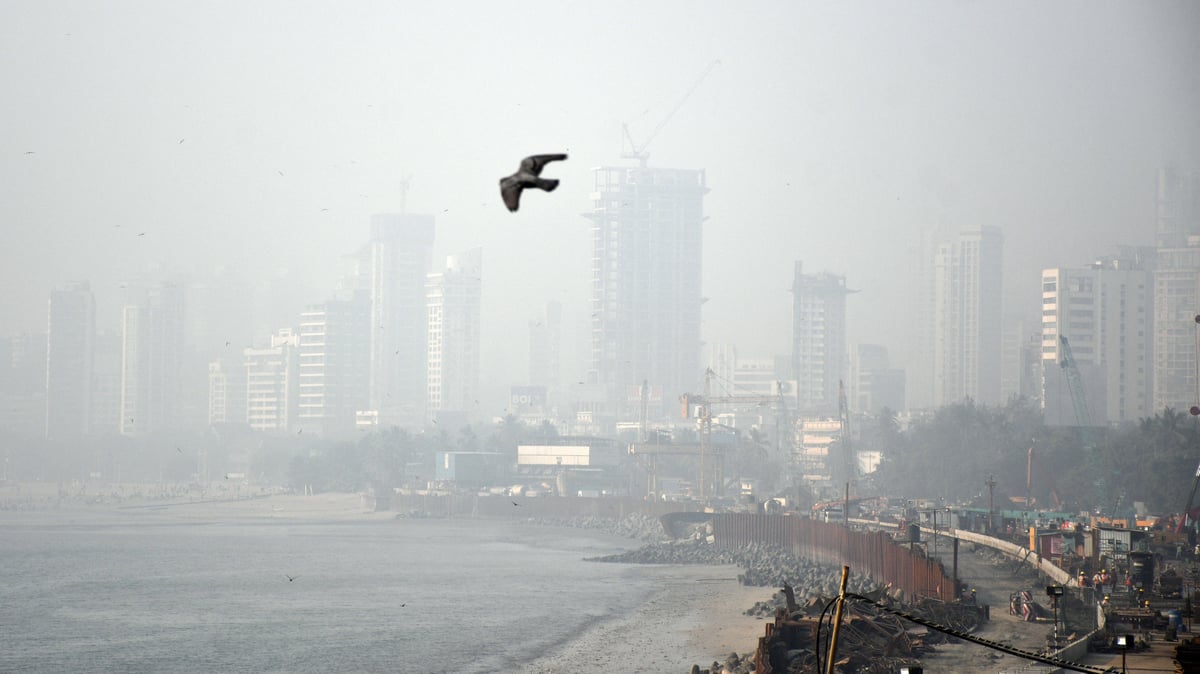

Mumbai, India's financial capital, has been facing a steep decline in air quality, resulting in a drop from tenth to 28th in the national rankings. The report, released by the Ministry of Environment, evaluates cities based on their implementation of measures to combat air pollution. Despite receiving the highest grant from the Centre, Mumbai's local administration has been unable to effectively tackle man-made pollution sources, leading to a spike in PM10 components. Additionally, despite receiving the largest funding in India, sectors like solid waste management and road dust mitigation have barely received any allocation, raising concerns over inadequate mapping and measures to tackle air pollution in Mumbai.
Mumbai's Air Quality Crisis: A Growing Concern
Mumbai, India's financial capital, has been struggling with a persistent decline in air quality, raising concerns among residents and health experts alike. According to the latest report by the Ministry of Environment, Mumbai has dropped from the tenth position to 28th in the national rankings for air quality.
Causes of Air Pollution in Mumbai
The primary causes of air pollution in Mumbai include:
Government Initiatives
Despite receiving the highest grant from the central government for air pollution control, Mumbai's local administration has been criticized for its ineffective implementation of measures to combat pollution. The city has been slow to address man-made pollution sources, leading to a spike in particulate matter (PM10) levels. Additionally, inadequate allocation of funds to sectors such as solid waste management and road dust mitigation has hindered efforts to improve air quality.
Health Implications
Poor air quality has significant health implications for Mumbai's residents. Exposure to high levels of PM10 particles can lead to respiratory problems, heart disease, and stroke. Children, the elderly, and those with existing respiratory conditions are particularly vulnerable to the adverse effects of air pollution.
Top 5 FAQs and Answers
1. What are the major sources of air pollution in Mumbai? Answer: Vehicular emissions, industrial activities, construction and demolition, open burning of waste, and road dust.
2. Why has Mumbai's air quality declined in recent years? Answer: Ineffective implementation of air pollution control measures by the local administration, slow response to man-made pollution sources, and inadequate funding for key sectors.
3. What are the health risks associated with poor air quality in Mumbai? Answer: Respiratory problems, heart disease, stroke, and increased susceptibility to other health conditions.
4. What steps is the government taking to improve air quality in Mumbai? Answer: The government has allocated funds for air pollution control measures, but their implementation has been criticized as ineffective.
5. What can individuals do to reduce air pollution in Mumbai? Answer: Reduce vehicle use, conserve energy, avoid open burning, and support organizations working to improve air quality.
Conclusion
The decline in air quality in Mumbai is a serious concern that requires immediate attention. The local administration must take proactive steps to address the sources of air pollution, implement effective mitigation measures, and ensure adequate funding for air pollution control initiatives. By working together, the government, businesses, and residents can work towards improving air quality and safeguarding the health of Mumbai's population.

Former Nizamabad MP Kalvakuntla Kavitha's interactive session on X is generating significant buzz and is anticipated to draw wide participation from supporters, critics, and neutrals. The session is likely to feature sharp questions on her political prospects and controversies surrounding her party's leadership, providing a platform for her to directly address criticism. With her national profile and assertive online presence, the session is expected to trend and generate substantial engagement, with potential to reignite political debates at both a state and national level.

On the 75th death anniversary of Sardar Vallabhbhai Patel, Prime Minister Modi paid tribute to the "Iron Man" of India, highlighting his immense contribution in unifying the country after Independence. Known as India's first Deputy Prime Minister and Home Minister, Patel was a pivotal figure in the integration of over 560 princely states to form the Republic of India. His legacy as a leader and visionary continues to inspire generations in nation-building and governance.

Maurya pays tribute to Sardar Patel on his 150th birth anniversary, hailing him as a symbol of India’s unity and strength. He praises the Prime Minister’s efforts in realizing Patel’s dream of a united and self-reliant India. The Deputy Chief Minister also emphasizes the importance of the Statue of Unity in showcasing India’s cultural pride and resolve. He urges citizens to visit the monument, which stands as a testament to Patel’s legacy of a united and strong India.

Despite facing setbacks such as rape charges against one of its MLA and increased welfare pension by the ruling party, the United Democratic Front (UDF) emerges victorious in the local body elections in Kerala. The results show a strong anti-incumbency wave and the UDF manages to win key constituencies like Kochi, Kannur, Kollam, and Thrissur in a surprising turn of events. This has boosted the confidence of the Congress, with senior leaders like Rahul Gandhi and Ramesh Chennithala terming it as a clear sign of their growing popularity in the state.

Amid the recent terrorist attack targeting the Jewish community in Sydney, Australia, US President Donald Trump offered words of reassurance and encouraged prideful celebration for those observing Hanukkah. He expressed his disdain for the attack and praised the bravery of the man who tackled one of the attackers. Trump also reminded everyone to come together to celebrate the holiday and condemn such heinous acts of hate.

Nitin Nabin, BJP's newly appointed National Working President, thanked Prime Minister Narendra Modi and the party's senior leaders for entrusting him with the top organizational responsibility. He also credited the hardworking party workers for the success of BJP across the nation. Nabin hit out at the Congress for using abusive language against PM Modi, stating that it only strengthens him. He also praised the party workers for their dedication and hard work in maintaining BJP's winning streak in his constituency as well as West Patna.

Maharashtra Chief Minister Devendra Fadnavis has dismissed criticism from the Opposition regarding the law and order situation in the state, citing a high conviction rate of 96.24%. He also highlighted the improved response time for the 'Dial 112' service and a decrease in crime in Pune. Additionally, Fadnavis addressed concerns over crimes against women and children and stated that the registration rate for complaints is over 99%.

The BJP's Parliamentary Board, on Sunday, appointed five-term MLA and Bihar Cabinet Minister Nitin Nabin as the party's national working president. This sets him up as a potential successor to current national president J P Nadda in January, marking a shift in the party's leadership towards a younger generation. With crucial Assembly elections approaching, Nabin's election as party president could have significant implications on the party's future direction, and his appointment has received praise from top leaders like Prime Minister Narendra Modi and Home Minister Amit Shah.

Amid the chaos and tragedy of the Sydney Bondi Beach attack, a bystander has emerged as a hero after bravely disarming a gunman. Ahmed al Ahmed, a local fruit shop owner, charged at one of the gunmen and successfully took away their weapon, risking his own life in the process. He has since been identified as a father of two and is receiving treatment in the hospital, while being praised globally for his heroic actions.

The Bharatiya Janata Party has shocked many with its decision to elevate Bihar minister Nitin Nabin as its national working president, making him the youngest person to hold the position. This move marks a significant leadership reset within the party and is likely to have a domino effect on the internal hierarchy. Along with the appointment of an OBC leader as BJP's UP unit president, this strategic shakeup suggests that the party is preparing for the next electoral cycle and setting the stage for a post-Modi era.